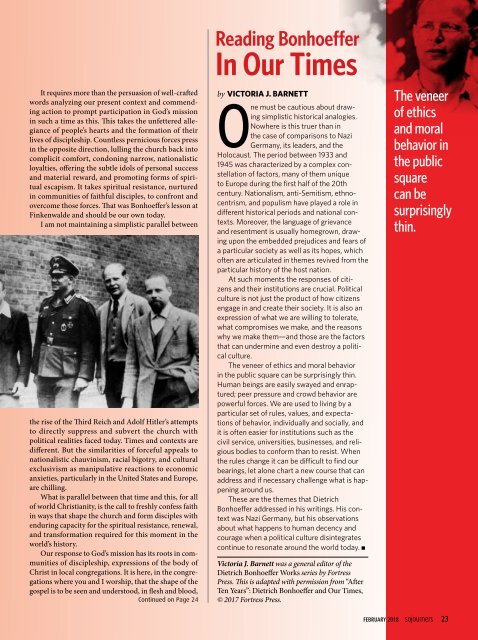february-2018
Create successful ePaper yourself
Turn your PDF publications into a flip-book with our unique Google optimized e-Paper software.
It requires more than the persuasion of well-crafted<br />
words analyzing our present context and commending<br />
action to prompt participation in God’s mission<br />
in such a time as this. This takes the unfettered allegiance<br />
of people’s hearts and the formation of their<br />
lives of discipleship. Countless pernicious forces press<br />
in the opposite direction, lulling the church back into<br />
complicit comfort, condoning narrow, nationalistic<br />
loyalties, offering the subtle idols of personal success<br />
and material reward, and promoting forms of spiritual<br />
escapism. It takes spiritual resistance, nurtured<br />
in communities of faithful disciples, to confront and<br />
overcome those forces. That was Bonhoeffer’s lesson at<br />
Finkenwalde and should be our own today.<br />
I am not maintaining a simplistic parallel between<br />
the rise of the Third Reich and Adolf Hitler’s attempts<br />
to directly suppress and subvert the church with<br />
political realities faced today. Times and contexts are<br />
different. But the similarities of forceful appeals to<br />
nationalistic chauvinism, racial bigotry, and cultural<br />
exclusivism as manipulative reactions to economic<br />
anxieties, particularly in the United States and Europe,<br />
are chilling.<br />
What is parallel between that time and this, for all<br />
of world Christianity, is the call to freshly confess faith<br />
in ways that shape the church and form disciples with<br />
enduring capacity for the spiritual resistance, renewal,<br />
and transformation required for this moment in the<br />
world’s history.<br />
Our response to God’s mission has its roots in communities<br />
of discipleship, expressions of the body of<br />
Christ in local congregations. It is here, in the congregations<br />
where you and I worship, that the shape of the<br />
gospel is to be seen and understood, in flesh and blood,<br />
Continued on Page 24<br />
Reading Bonhoeffer<br />
In Our Times<br />
by VICTORIA J. BARNETT<br />
One must be cautious about drawing<br />
simplistic historical analogies.<br />
Nowhere is this truer than in<br />
the case of comparisons to Nazi<br />
Germany, its leaders, and the<br />
Holocaust. The period between 1933 and<br />
1945 was characterized by a complex constellation<br />
of factors, many of them unique<br />
to Europe during the first half of the 20th<br />
century. Nationalism, anti-Semitism, ethnocentrism,<br />
and populism have played a role in<br />
different historical periods and national contexts.<br />
Moreover, the language of grievance<br />
and resentment is usually homegrown, drawing<br />
upon the embedded prejudices and fears of<br />
a particular society as well as its hopes, which<br />
often are articulated in themes revived from the<br />
particular history of the host nation.<br />
At such moments the responses of citizens<br />
and their institutions are crucial. Political<br />
culture is not just the product of how citizens<br />
engage in and create their society. It is also an<br />
expression of what we are willing to tolerate,<br />
what compromises we make, and the reasons<br />
why we make them—and those are the factors<br />
that can undermine and even destroy a political<br />
culture.<br />
The veneer of ethics and moral behavior<br />
in the public square can be surprisingly thin.<br />
Human beings are easily swayed and enraptured;<br />
peer pressure and crowd behavior are<br />
powerful forces. We are used to living by a<br />
particular set of rules, values, and expectations<br />
of behavior, individually and socially, and<br />
it is often easier for institutions such as the<br />
civil service, universities, businesses, and religious<br />
bodies to conform than to resist. When<br />
the rules change it can be difficult to find our<br />
bearings, let alone chart a new course that can<br />
address and if necessary challenge what is happening<br />
around us.<br />
These are the themes that Dietrich<br />
Bonhoeffer addressed in his writings. His context<br />
was Nazi Germany, but his observations<br />
about what happens to human decency and<br />
courage when a political culture disintegrates<br />
continue to resonate around the world today. n<br />
Victoria J. Barnett was a general editor of the<br />
Dietrich Bonhoeffer Works series by Fortress<br />
Press. This is adapted with permission from “After<br />
Ten Years”: Dietrich Bonhoeffer and Our Times,<br />
© 2017 Fortress Press.<br />
The veneer<br />
of ethics<br />
and moral<br />
behavior in<br />
the public<br />
square<br />
can be<br />
surprisingly<br />
thin.<br />
FEBRUARY <strong>2018</strong> sojourners 23


